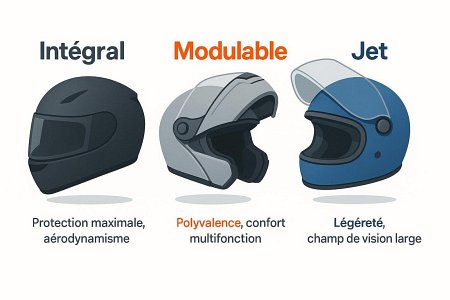
Les casques de moto d’aujourd’hui vont bien plus loin qu’être de simples protections. Grâce aux progrès constants en matériaux, en technologies d’absorption des chocs, et en équipements intelligents, ils améliorent nettement la sécurité, le confort, et l’expérience de conduite. Le nouveau casque de moto n’est plus seulement un accessoire obligatoire, mais un équipement essentiel pour rouler en sécurité.
Cette évolution s’accompagne de nouvelles solutions technologiques et de designs pensés pour la sécurité et la facilité d’utilisation. Il ne s’agit plus seulement de résister aux chocs : désormais, les casques modernes proposent aussi des systèmes d’alerte, de communication, et de confort qui étaient impensables il y a quelques années.
Les marques cherchent à offrir des équipements qui protègent vraiment et rendent chaque trajet plus agréable.
Pourquoi la sécurité des casques de moto progresse-t-elle autant ?
L’amélioration rapide des casques répond au besoin de mieux protéger les motards face aux dangers de la route. La moto procure des sensations de liberté, mais elle expose à de vrais risques. Innover dans la sécurité est donc incontournable pour limiter les effets des accidents et aider à gérer les situations d’urgence.
Le casque ne protège pas seulement parce que c’est obligatoire, il sauve des vies. Il doit absorber le choc et éviter que la tête et le cerveau ne soient gravement touchés. D’où la recherche continue de nouveaux matériaux et technologies pour mieux répartir l’énergie en cas d’impact, tout en ajoutant du confort et de nouvelles fonctions utiles.
Pour bénéficier de ces innovations technologiques, il est essentiel de se tourner vers des revendeurs qui suivent les dernières évolutions du marché. Des magasins spécialisés comme Gmoto proposent les modèles de casques les plus récents, intégrant les dernières avancées en matière de matériaux, de systèmes de ventilation et de technologies de protection. Ces professionnels peuvent vous orienter vers les casques qui offrent le meilleur rapport sécurité-confort selon vos besoins.
Quelques chiffres à connaître sur les accidents de moto et les risques de traumatisme
Les chiffres sur les accidents motivent l’innovation. Les motards, quelles que soient leurs compétences, prennent des risques chaque fois qu’ils roulent. Beaucoup d’études montrent que ceux qui ne portent pas de casque se blessent bien plus gravement à la tête. Un casque bien conçu peut nettement réduire ces risques.
Par exemple, un casque intégral réduit de 40 % le risque de traumatisme crânien par rapport à un casque ouvert. Ces données rappellent l’importance de bien choisir son équipement et encouragent les fabricants à renforcer sans cesse la sécurité des casques, notamment contre les impacts obliques qui sont souvent les plus dangereux.
Quels sont les principaux dangers sans protection ?
En cas de chute sans casque, la tête est très exposée aux coups violents. Cela peut aller d’une simple commotion à une lésion grave du cerveau, voire pire. Sans protection, le risque de fracture du crâne, de saignement ou de blessures au cerveau monte en flèche.
Il y a aussi les blessures au visage, les coupures, les risques pour les yeux à cause du vent, de la poussière, ou des projections. Un casque fait barrière à tout cela : il protège la tête, garde la vision claire et protège aussi face aux débris ou aux insectes.
Les différents types de casques et leur niveau de sécurité
Il existe de nombreux modèles de casques, chacun adapté à un usage précis et à différents niveaux de protection. Bien choisir son casque, selon son usage et ses attentes en sécurité, est important.
Les constructeurs améliorent tous les types de casques, pour que chaque motard trouve celui qui correspond à ses besoins. L’essentiel est de ne jamais faire de compromis sur la sécurité, même si l’apparence ou d’autres critères entrent en jeu.
Tableau comparatif : Intégral, modulable, jet
| Type
| Protection
| Usage conseillé
| Intégral
| Maximale (tête et visage)
| Longs trajets, autoroute, piste
| Modulable
| Bonne (config. fermée), moyenne (ouvert)
| Ville et route, conduite mixte
| Jet
| Minimale (crâne), visage exposé
| Courtes distances, climat chaud
|
Le casque intégral protège le mieux. Il couvre la tête et le visage, protège contre les chocs, les frottements, le froid et la pluie. Les marques comme Shoei, Shark ou Arai proposent des modèles haut de gamme faits avec des fibres de carbone, à la fois solides et légers.
Le casque modulable permet de relever la mentonnière. Il est pratique en ville ou lors des pauses, mais une fois ouvert, il protège moins bien qu’un intégral. Il ne faut donc jamais rouler vite en position ouverte.
Le casque jet est léger et agréable en ville, mais il ne protège pas le visage. Il est conseillé pour le scooter ou la basse vitesse. Pour des trajets rapides ou longs, mieux vaut choisir une protection complète. Dans tous les cas, le casque doit être certifié et bien ajusté à la tête.

Comment les nouveaux matériaux rendent les casques plus sûrs
La sécurité des casques dépend beaucoup des progrès en matériaux. Les fabricants cherchent à créer des coques plus résistantes et plus légères pour l’utilisateur. Cela permet à la fois de mieux protéger contre les chocs et d’assurer un bon confort, même en portant le casque longtemps.
Ces matériaux sont pensés pour absorber l’énergie du choc, qu’il soit direct ou de côté. L’idée est de répartir au maximum la force de l’impact pour éviter des blessures graves.
Zoom sur les matériaux innovants
-
Fibres composites : Mélange de fibres (verre, carbone, aramide) et de résine, pour une coque solide et légère.
-
Fibre de carbone : Très résistante et légère, idéale pour les casques sportifs ou haut de gamme. Diminue la fatigue sur longs trajets.
-
Alliages avancés : Utilisés pour l’intérieur et certains éléments, ils ajoutent à la fiabilité du casque.
À l’inverse, ces matériaux coûtent plus cher à produire et la fabrication demande beaucoup de précautions pour garantir leur qualité. Malgré le prix, ils apportent un vrai gain de sécurité et de confort.
Absorption des chocs et poids réduit
Les nouveaux matériaux absorbent mieux les chocs et rendent les casques plus faciles à porter. Le polycarbonate, le Kevlar ou le polystyrène expansé (EPS) répartissent l’énergie sur plusieurs couches lors de l’impact, protégeant la tête du pilote.
Un casque léger force moins sur la nuque et les épaules, ce qui permet de rester concentré et réactif, même en roulant longtemps. Moins de fatigue, c’est aussi plus de sécurité pour le conducteur.
Quelles technologies de sécurité sont intégrées dans les casques actuels ?
Les casques modernes ne se limitent plus à une simple protection physique. Ils intègrent aujourd’hui des dispositifs technologiques pour détecter une chute, prévenir les secours, ou limiter les lésions lors de certains chocs. Cela change profondément la façon dont un casque protège en cas d’accident.
Systèmes anti-rotation comme MIPS
Le MIPS (Multi-directional Impact Protection System) est l’une des grandes avancées récentes. Ce système ajoute une couche interne qui peut bouger légèrement, absorbant une partie des forces de rotation lors des chocs obliques – situations qui peuvent endommager le cerveau.
Beaucoup de marques haut de gamme utilisent désormais cette technologie pour une protection en cas d’accident complexe.
Alerte en cas de chute et appel d’urgence
Certains casques contiennent des capteurs capables de repérer un accident important. En cas de chute, ils envoient automatiquement une alerte aux secours ou à des proches, avec la position GPS. Cela accélère la prise en charge, surtout si le motard est inconscient ou seul sur une route peu fréquentée.
Casques avec airbag intégré
Certains modèles offrent un airbag intégré ou compatible avec un gilet airbag externe. En cas de chute brutale, l’airbag se gonfle autour du cou et du crâne, limitant le risque de fracture cervicale. Bien que ces modèles restent peu courants et coûteux, ils offrent une sécurité supplémentaire, notamment pour ceux qui roulent beaucoup ou en ville.
Connectivité et fonctionnalités intelligentes sur les casques de moto
Les fonctions connectées ne sont plus de simples gadgets. Elles apportent plus de sécurité et de confort en gardant l’attention du pilote sur la route. Les casques intelligents permettent de rester joignable, d’écouter des instructions ou de communiquer avec d’autres motards.
Bluetooth, GPS et communication
-
Connexion Bluetooth pour appels, musique, GPS
-
Intercom pour discuter avec d’autres motards sans utiliser les mains
-
Commande vocale pour régler volume ou changer la chanson sans lâcher le guidon
-
Affichage sur la visière (HUD) pour garder un œil sur la route tout en recevant les instructions
Ces outils sont surtout utiles en groupe ou lors de longs trajets, facilitant la coordination et limitant les distractions. Le motard peut suivre l’itinéraire ou rester en contact avec les autres sans quitter la route des yeux.
Alertes de dangers et informations instantanées
Certains casques analysent l’environnement en temps réel. Ils envoient une alerte si un véhicule approche dans un angle mort ou si un danger se présente (trafic, plaques de verglas). De petites lumières ou une projection sur la visière attirent l’attention du pilote sans l’obliger à détourner les yeux.
Pourquoi le confort et l’ergonomie sont-ils importants pour la sécurité ?
Un casque inconfortable ou mal ajusté fatigue le motard et déconcentre. Avec l’évolution des matériaux et des mousses, les casques modernes cherchent à offrir un port agréable même pendant de longues heures. L’ajustement et le confort jouent donc un rôle direct dans la sécurité au quotidien.
Ventilation et gestion de la chaleur
Une bonne aération permet de rouler plus longtemps sans avoir trop chaud, surtout l’été. Les systèmes de ventilation sophistiqués empêchent la surchauffe, ce qui limite la fatigue et l’inattention.
Ajustement et adaptation à toutes les formes de tête
Des mousses à mémoire de forme ou des rembourrages modulables offrent un maintien parfait. Un casque bien ajusté tient mieux en cas de choc et assure plus de stabilité, sans points de pression douloureux. Il existe aussi des modèles prévus pour les porteurs de lunettes et garantissant une large vision.
Réduction du bruit
Les bruits du vent ou du trafic fatiguant vite, les casques intègrent des techniques d’isolation pour rouler dans le calme. Certains proposent même des systèmes antibruit électroniques. Cela permet au pilote de mieux entendre les dangers autour de lui et de rester concentré plus longtemps.
Normes de sécurité : comment choisir son casque ?
Choisir un casque certifié est indispensable. Les normes sont là pour garantir que le casque a passé des tests sévères et répond à des exigences strictes. Même si tout cela semble compliqué, quelques repères essentiels sont à connaître pour faire un bon choix.
Tableau des principales certifications
| Norme
| Pays/Zone
| Details
| ECE 22.05 / 22.06
| Europe
| Tests multi-directionnels, impacts variés, nouvelle 22.06 plus stricte
| DOT
| USA
| Contrôle de l’absorption à l’impact direct
| Snell
| International
| Testé pour impacts multiples, très stricte, ciblé compétition
| SHARP
| Royaume-Uni
| Note de 1 à 5 étoiles sur une batterie de tests dépassant la norme minimale
|
Chacune de ces normes vérifie différents critères, mais toutes servent à garantir une vraie solidité lors d’un accident. Il faut toujours contrôler la présence de l’une de ces certifications avant d’acheter. C’est le seul moyen d’être certain que le casque protègera en cas de choc sérieux.
Que doit-on comprendre des certifications ?
Une certification prouve qu’un casque a surmonté des tests reproduisant des situations de chocs réels – résistance de la coque, absorption de l’impact, fiabilité de la jugulaire, solidité de la visière. Un casque homologué apporte donc une vraie sécurité, que l’on roule en ville ou à la campagne. Pensez à vérifier cette information, c’est essentiel.
Les dernières nouveautés et les prochaines étapes dans la sécurité des casques
Les casques de moto continuent d’évoluer grâce à de nouvelles idées et à des matériaux innovants. Les recherches récentes montrent que les prochaines générations de casques seront encore mieux protégées, plus légères et plus intelligentes.
Connectivité et réalité augmentée
Demain, les casques proposeront des affichages sur la visière (réalité augmentée) : vitesse, navigation, appels et alertes de dangers s’afficheront sans jamais quitter la route des yeux. L’intelligence artificielle aidera même à anticiper le risque d’accident ou de collision et à prévenir automatiquement le pilote.
Matériaux intelligents
La recherche avance sur de nouveaux matériaux comme le graphène, très léger et résistant, ou des fibres capables de se réparer seules après de petites rayures ou fissures, prolongeant la durée de vie des casques. Des efforts sont aussi faits sur l’écologie, en utilisant des matériaux recyclables pour répondre aux enjeux environnementaux.
Casques de moto : la preuve d’une baisse réelle des blessures graves
Les derniers progrès sur les casques – nouveaux matériaux, meilleurs systèmes anti-choc, technologies embarquées – permettent de mieux protéger contre les traumatismes graves. Les équipements intelligents, comme MIPS, les airbags ou les alertes de chute, diminuent sérieusement la gravité des accidents. Cela se traduit par moins de blessures à la tête et au cou, ainsi qu’une meilleure prise en charge après un accident.
Un casque moderne bien choisi, c’est donc plus que du confort ou un simple achat : c’est faire le choix de la sécurité pour chaque trajet, qu’on soit débutant ou très expérimenté. Il rend la conduite plus sûre, plus agréable, et prépare les motards à l’avenir de la route. Investir dans un casque évolué et certifié, c’est investir dans sa vie.
Questions fréquentes sur la sécurité des casques de moto modernes
Faut-il changer de casque après un choc ?
Oui, il faut toujours remplacer un casque après un coup fort ou une chute. Même s’il n’a pas l’air abîmé, l’intérieur peut avoir perdu sa capacité à absorber les chocs. Un casque fragilisé ne protège plus correctement.
Combien de temps un casque reste-t-il sûr ?
En général, le casque doit être remplacé tous les 5 ans, ou après 3 ans d’usage courant. L’exposition au soleil, à l’humidité et à la transpiration use petit à petit l’intérieur et la coque. Un casque bien entretenu, gardé à l’abri, peut durer plus longtemps, mais il faut inspecter régulièrement pour repérer tout signe de fissure, d’usure ou de déformation. Si doute, mieux vaut changer.




















